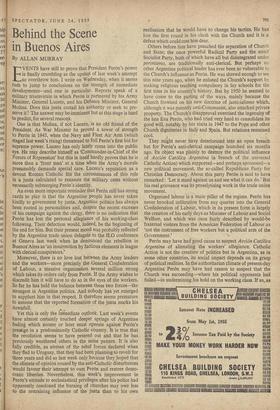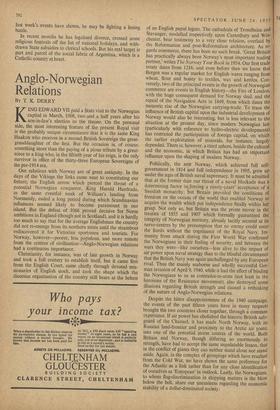Behind the Scene in Buenos Aires
By ALLANMURRAY . EVENTS have still to prove that President Per6n's power is finally crumbling as the upshot of last week's attempt to overthrow him. I write on Wednesday, when it seems rash to jump to conclusions on the strength of immediate developments—and one in particular. Reports speak of a military triumvirate in which PerOn is partnered by his Army Minister, General Lucero, and his Defence Minister, General Molina. Does this junta curtail his authority or seek to pre- serve it? The answer may be imminent but at this stage is hard to predict, for several reasons.
One is that Molina, if not Lucero, is an old friend of the President. As War Minister he proved a tower of strength to Peron in 1945, when the Navy and Fleet Air Arm (which staged last week's rising) threatened to foil Per6n's first bid for supreme power. Lucero has only lately come into the public eye. He may describe himself as 'Commander-in-Chief of the Forces of Repression' but this in itself hardly proves that he is more than a 'front man' at a time when the Army's morale presumably demands special care. Lucero's reputation as a devout Roman Catholic fits the circumstances of this role in a junta calculated to reassure the military caste without necessarily submerging Peron's identity.
An even more important reminder that Peron still has strong cards to play is that the Argentine people has never taken kindly to government by junta. Argentine politics has always been rooted in personalities and, despite the recent excesses of his campaign against the clergy, there is no indication that Peron has lost the personal allegiance of his working-class following. Their defection would, indeed, be the beginning of the end for him. But their present mood was probably reflected' by the Argentine trade union delegate to the ILO conference at Geneva last week when he denounced the rebellion in Buenos'Aires as 'an insurrection by factious elements in league with clerical conspirators.'
Moreover, there is no love lost between the Army leaders and the workers—more precisely the General Confederation of Labour, a massive organisation several million strong which takes its orders only from Peron. If the Army wishes to discredit him it will have to do so in the eyes of the workers. So far he has held the balance between these two forces—the strongest in Argentine politics. And nobody has yet emerged to supplant him in that respect. It therefore seems premature to assume that the reported formation of the junta marks his downfall.
Yet this is only the immediate outlook. Last week's events have almost certainly touched deeper springs of Argentine feeliit which sooner or later must operate against Per6n's prestige in a predominantly Catholic country. It is true that the revolution seems to have petered out and that he has previously weathered others in the same pattern. It is also fully credible, as airmen of the rebel forces declared when they fled to Uruguay, that they had been planning to revolt for three years and did so last week only because they hoped that the climate of opinion roused by the anti-Catholic disturbances would favour their attempt to oust Per6n and restore demo- cratic liberties. Nevertheless, this week's improvement in PerOn's attitude to ecclesiastical privileges after his police had apparently condoned the burning of churches may owe less to the restraining influence of the junta than to his own realisation that he would have to change his tactics. He has lost the first round in his clash with the Church and it is a defeat which could cost him dear.
Others before him have preached the separation of Church and State; the once powerful Radical Party and the small Socialist Party, both of which have all but disintegrated uncle, peronismo, are traditionally anti-clerical. But perhaps no other Argentine political leader has ever been so vulnerable to the Church's influence as Peron. He was shrewd enough to see this nine years ago, when he enlisted the Church's support by making religious teaching compulsory in lay schools for the first time in his country's history. But by 1950 he seemed to have come to the parting of the ways, mainly because the Church frowned on his new doctrine of justicialismo which, although it was patently anti-Communist, also attacked private property. The Church's disapproval exercised the ingenuity of the late Eva Peron, who had tried very hard to consolidate its good will, notably by her visits in 1947 to the Pope and other Church dignitaries in Italy and Spain. But relations remained cool.
They might never have deteriorated into an open breach but for Peron's anti-clerical campaign launched six months ago. Its object was plainly to destroy the political influence of Accion Catalica Argentina (a branch of the universal Catholic Action) which supported—and perhaps sponsored—a new political movement, the so-called Republican Party for Christian Democracy. About this party Peron is said to have remarked : 'Let it stand against us and see what it can do.' But his real grievance was its proselytising work in the trade union movement.
Organised labour is a main pillar of the regime. Peron has never brooked infiltration from any quarter into the General Confederation of Labour, which in its present form is largely the creation of his early days as Minister of Labour and Social Welfare, and which was once fairly described by would-be fraternal visitors from the American Federation of Labour as 'not the instrument of free workers but a political arm of the Government.'
Peron may have had good cause to suspect Accion Cat6lica Argentina of alienating the workers' allegiance. Catholic Action is not the creature of politics but in Argentina, as in some other countries, its social impact depends on its grasp of political realities. In the authoritarian climate of present-day Argentina Peron may have had reason to suspect that the Church was succeeding—where his political opponents had failed—in undermining his hold on the working class. If so, as last week's events have shown, he may be fighting a losing battle.
In recent months he has legalised divorce, crossed some religious festivals off the list of national holidays, and with- drawn State subsidies to clerical schools. But his real target is part and parcel of the social fabric of Argentina, which is a Catholic country at heart.


















































 Previous page
Previous page